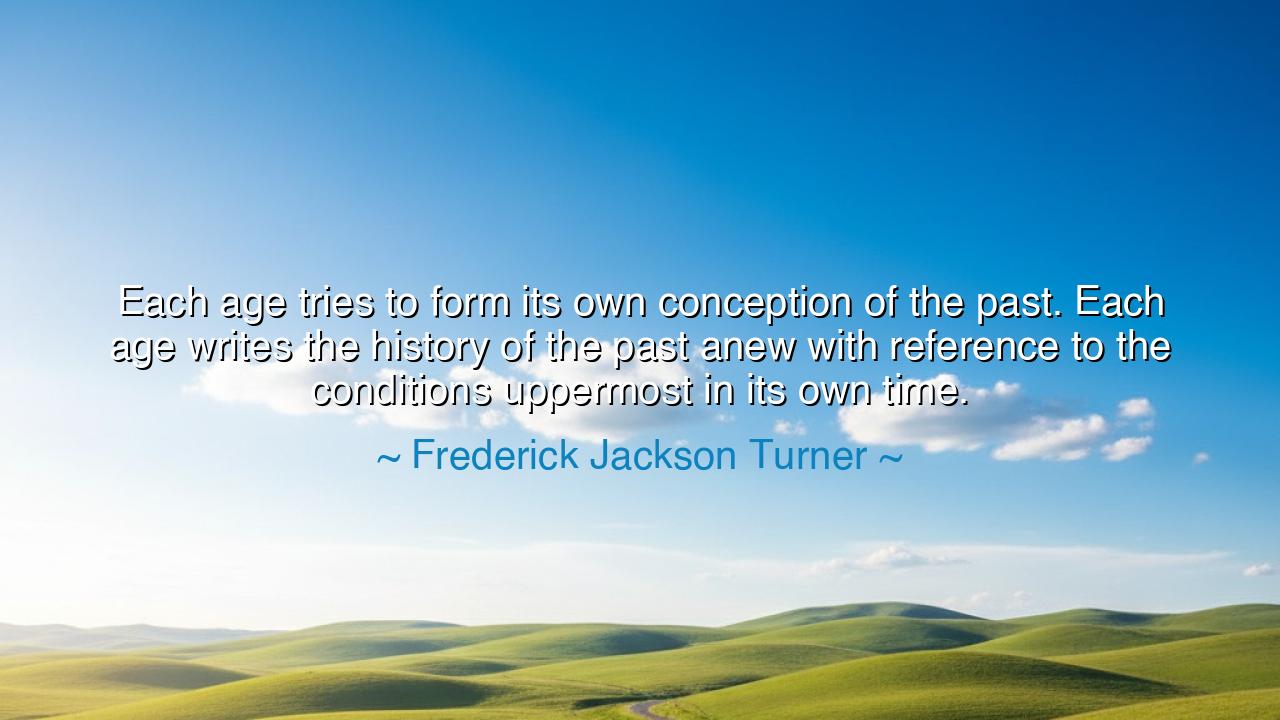
Each age tries to form its own conception of the past. Each age
Each age tries to form its own conception of the past. Each age writes the history of the past anew with reference to the conditions uppermost in its own time.






In the unfolding tale of humanity, where the threads of time weave the stories of nations and individuals alike, there exists a deep truth about how we perceive the past. Frederick Jackson Turner offers a profound insight when he says, "Each age tries to form its own conception of the past. Each age writes the history of the past anew with reference to the conditions uppermost in its own time." These words speak to the dynamic and ever-changing nature of how history is understood, interpreted, and reinterpreted across the generations. The way we view the past is not fixed but is instead shaped by the perspectives, concerns, and values of the present. History, in this sense, is not a static record of events, but a living narrative that evolves as each new generation seeks to make sense of its place in the world.
The ancients knew that history was not a simple recounting of facts but a reflection of the values and struggles of the people who lived in any given time. Herodotus, often called the "Father of History," wrote of the Greeks and their conflicts with the Persians, yet his account was not merely a list of events; it was a study of the cultures involved, a meditation on the reasons behind war, empire, and human behavior. His history was influenced by his own context—the Greek perspective on the world, shaped by the rise of city-states and the challenges they faced. Herodotus was not just recording the past but shaping it, interpreting it in light of the world he knew. The same is true of Thucydides, whose history of the Peloponnesian War focused not just on events, but on the human condition, showing how war, ambition, and moral decay shaped the fates of nations. In this way, the ancient historians were also creating histories that reflected their own age and its concerns.
As Turner reminds us, each age looks back on history not as a mere observer, but as a participant, influenced by the present conditions of its time. This is no more evident than in the way the American West was perceived during Turner’s own era. In his frontier thesis, Turner argued that the closing of the American frontier marked the end of an era, and the beginning of a new chapter in the nation's history. He viewed the frontier as a shaping force in the development of American democracy and individualism, drawing lessons from the past to explain the present. Turner’s view of history was shaped by the challenges of his time—an era of rapid industrialization, urbanization, and the decline of the rural frontier. In his eyes, the past was not something to be objectively preserved, but something to be interpreted through the lens of contemporary concerns and national identity.
In more recent history, the way we view colonialism and imperialism has been redefined by the post-colonial world. The stories of European powers that once glorified their conquest and domination are now re-examined through the eyes of those who suffered under them. The history of empire is no longer just a tale of conquest and glory, but one of oppression, exploitation, and resistance. This shift in perspective is not an accident; it is the result of the changing political realities of the present, where former colonies have reclaimed their voices and their stories. Just as Turner suggested, each new age writes the history of the past not with objectivity, but in response to the conditions that define its present. The past is reinterpreted as a means of understanding the present and shaping the future.
The lesson Turner imparts is this: history is not an immutable truth but a living conversation between the past and the present. Every generation writes its own version of history, shaped by the challenges and beliefs of its time. History, in this sense, is a tool—not just for understanding what happened, but for shaping the future. As we look back on the events that have defined our world, we must be mindful of the lens through which we view them. The values and concerns of today will inevitably influence how we interpret the past, and we must be aware of the forces that shape our understanding of history.
In our own time, this means recognizing that the history we create today—through our actions, our choices, and our narratives—will be understood and interpreted by future generations. What lessons will they draw from our era? What will be the legacy we leave behind, and how will it be shaped by the circumstances of their own time? Will they see us as a society that sought to balance freedom and equality, or as one that was shaped by division and disparity? The stories we tell today will be the histories of tomorrow, and it is up to us to consider how we will be remembered, not just for our actions, but for the stories we choose to tell.
Practical action calls us to be mindful of the histories we create and the narratives we choose to champion. As we live in our present age, we must reflect on the ways in which our values, decisions, and interpretations of the past shape the world that future generations will inherit. Let us write the history of our time with awareness, not just of what we are doing today, but of how our actions will be viewed in the future. Let us ensure that the history we leave behind is one of growth, learning, and progress, not just for the sake of our own generation, but for the generations to come.






AAdministratorAdministrator
Welcome, honored guests. Please leave a comment, we will respond soon